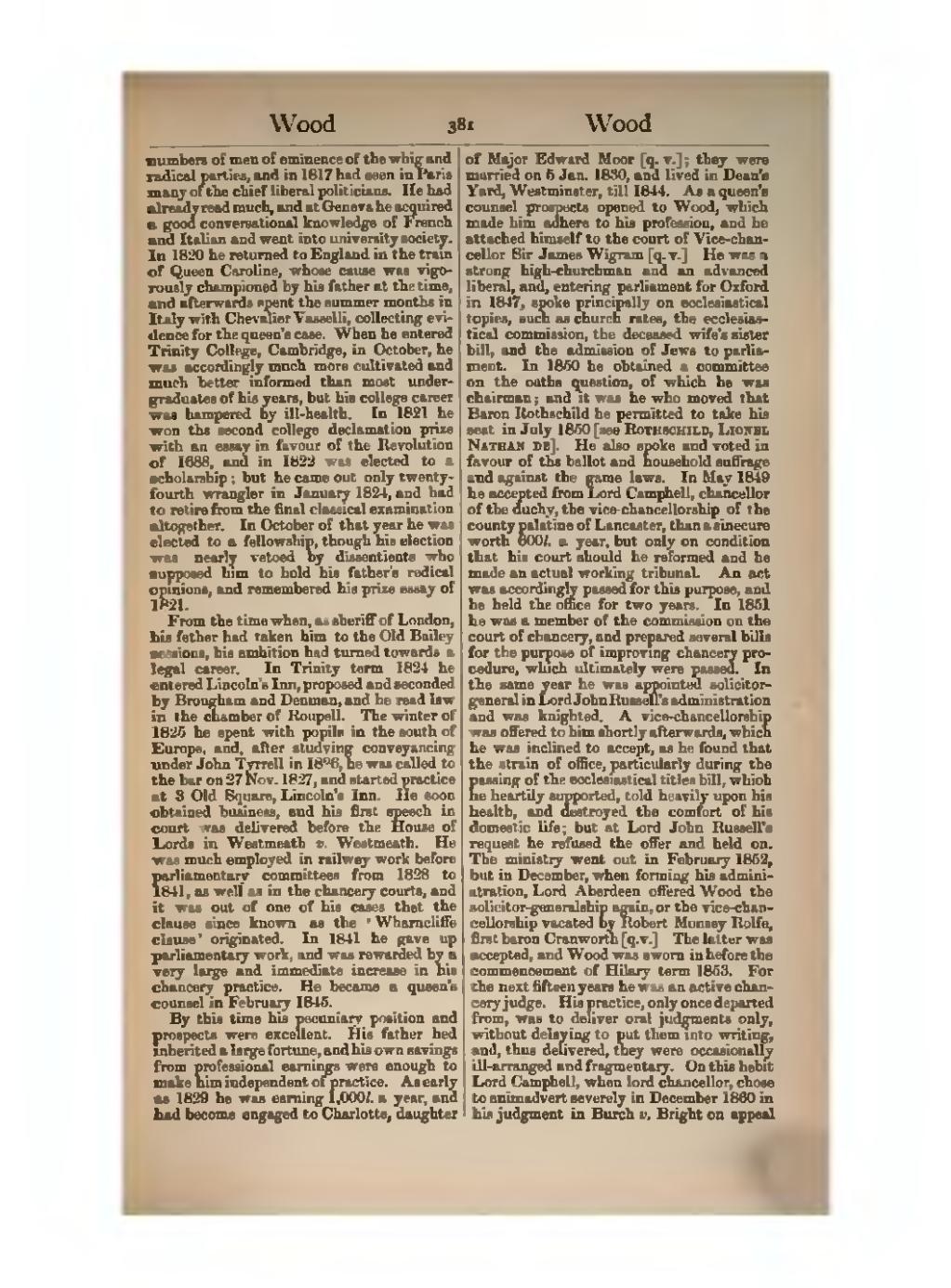numbers of men of eminence of the whig and radical parties, and in 1817 had seen in Paris many of the chief liberal politicians. He had already read much, and at Geneva he acquired a good conversational knowledge of French and Italian and went into university society. In 1820 he returned to England in the train of Queen Caroline, whose cause was vigorously championed by his father at the time, and afterwards spent the summer months in Italy with Chevalier Vasselli, collecting evidence for the queen's case. When he entered Trinity College, Cambridge, in October, he was accordingly much more cultivated and much better informed than most undergraduates of his years, but his college career was hampered by ill-health. In 1821 he won the second college declamation prize with an essay in favour of the Revolution of 1688, and in 1822 was elected to a scholarship; but he came out only twenty-fourth wrangler in January 1824, and had to retire from the final classical examination altogether. In October of that year he was elected to a fellowship, though his election was nearly vetoed by dissentients who supposed him to hold his father's radical opinions, and remembered his prize essay of 1821.
From the time when, as sheriff of London, his father had taken him to the Old Bailey sessions, his ambition had turned towards a legal career. In Trinity term 1824 he entered Lincoln's Inn, proposed and seconded by Brougham and Denman, and he read law in the chamber of Roupell. The winter of 1825 he spent with pupils in the south of Europe, and, after studying conveyancing under John Tyrrell in 1826, he was called to the bar on 27 Nov. 1827, and started practice at 3 Old Square, Lincoln's Inn. He soon obtained business, and his first speech in court was delivered before the House of Lords in Westmeath v. Westmeath. He was much employed in railway work before parliamentary committees from 1828 to 1841, as well as in the chancery courts, and it was out of one of his cases that the clause since known as the ‘Wharncliffe clause’ originated. In 1841 he gave up parliamentary work, and was rewarded by a very large and immediate increase in his chancery practice. He became a queen's counsel in February 1845.
By this time his pecuniary position and prospects were excellent. His father had inherited a large fortune, and his own savings from professional earnings were enough to make him independent of practice. As early as 1829 he was earning 1,000l. a year, and had become engaged to Charlotte, daughter of Major Edward Moor [q. v.]; they were married on 5 Jan. 1830, and lived in Dean's Yard, Westminster, till 1844. As a queen's counsel prospects opened to Wood, which made him adhere to his profession, and he attached himself to the court of Vice-chancellor Sir James Wigram [q. v.] He was a strong high-churchman and an advanced liberal, and, entering parliament for Oxford in 1847, spoke principally on ecclesiastical topics, such as church rates, the ecclesiastical commission, the deceased wife's sister bill, and the admission of Jews to parliament. In 1850 he obtained a committee on the oaths question, of which he was chairman; and it was he who moved that Baron Rothschild be permitted to take his seat in July 1850 [see Rothschild, Lionel Nathan de]. He also spoke and voted in favour of the ballot and household suffrage and against the game laws. In May 1849 he accepted from Lord Campbell, chancellor of the duchy, the vice-chancellorship of the county palatine of Lancaster, then a sinecure worth 600l. a year, but only on condition that his court should be reformed and be made an actual working tribunal. An act was accordingly passed for this purpose, and he held the office for two years. In 1851 he was a member of the commission on the court of chancery, and prepared several bills for the purpose of improving chancery procedure, which ultimately were passed. In the same year he was appointed solicitor-general in Lord John Russell's administration and was knighted. A vice-chancellorship was offered to him shortly afterwards, which he was inclined to accept, as the strain of office, particularly during the passing of the ecclesiastical titles bill, which he heartily supported, told heavily upon his health; but at Lord John Russell's request he refused the offer and held on. The ministry went out in February 1852, but in December, when forming his administration, Lord Aberdeen offered Wood the solicitor-generalship again, or the vice-chancellorship vacated by Sir George James Turner [q. v.], who was made lord justice in succession to the newly appointed lord chancellor Robert Monsey Rolfe, first baron Cranworth [q. v.] The latter was accepted, and Wood was sworn in before the commencement of Hilary term 1853. For the next fifteen years he was an active chancery judge. His practice, only once departed from, was to deliver oral judgments only, and, thus delivered, they were occasionally ill-arranged and fragmentary. On this habit Lord Campbell, when lord chancellor, chose to animadvert severely in December 1860 in his judgment in Burch v. Bright on appeal
